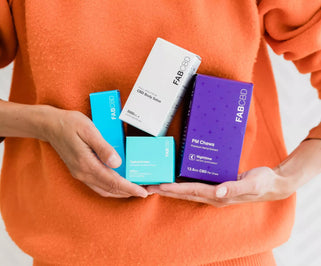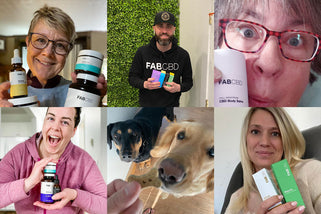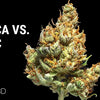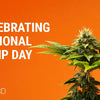There’s so much information to take in and understand when shopping for CBD oil. In fact, some terms might feel as if they’re completely opposite of each other. This is the exact case with organic and non-organic CBD. When it comes to the term “organic,” most of us have been conditioned to gravitate towards products with this label because they’re said to be cleaner, healthier, and free from harmful chemicals. But, in the world of CBD, organic and non-organic have very different meanings when it comes to talking about how hemp plants are grown, how oils are extracted, and how a brand gets its product to your doorstep. Is it better to buy organic over non-organic CBD? It’s time to learn what the difference is between the two and why you might choose one over the other.
What Makes a CBD Oil Organic?

Just as organic produce is measured up against a set of strict standards in order to be labeled that way, so also does CBD. Organic CBD products are held to extremely high standards that are set forth by the US Department of Agriculture, therefore, it’s not enough for the hemp to be grown without herbicides, pesticides, and other dangerous chemicals. In fact, the USDA guidelines specifically state that in order for a crop of hemp plants to be considered organic, the process must begin in the plot of land that the hemp grows in. This means that the soil must be clean of harmful chemicals like pesticides for about three years before any hemp can be grown there. Additionally, growers cannot use chemicals to boost plant growth. Instead, they must rotate their crops, find clean ways to till their soil, and use natural fertilizers. Another big no-no is the use of genetically engineered seeds or genetically-modified seeds.
If you think that this process is tough, wait until you hear what needs to happen next. After all of the hemp plants are harvested, they must conform to a set of extremely stringent rules and controls. Farmers must send all of their harvested hemp in for tough quality checks. Moreover, all non-agricultural ingredients that are used to cultivate the hemp must adhere to a strict list of federal guidelines. This list, otherwise known as the National List of Allowed and Prohibited Substances, features a listing of items that are considered prohibited. If farmers use anything from that list of prohibited items in the growing and harvesting of their hemp, their produce will fail to be labeled as organic. In order to ensure that their hemp is labeled as organic, farmers need to be diligent about keeping organic and non-organic hemp separated while they are harvesting the plants as well as keeping non-organic substances far away from where their organic hemp is growing.
Why is Organic Superior to Non-Organic?

When you think about the process that hemp has to go through in order to be labeled as organic, then it goes without saying that organic hemp far outweighs non-organic hemp. In the first place, organic hemp is free from preservatives, fillers, and other harmful chemicals. When farmers grow organic hemp, they do so under stringent supervision. Also, brands that produce organic hemp must use the industry-preferred CO2 extraction method to obtain their extracts. This process ensures only the purest and cleanest extracts come from the organic hemp. This method, which uses carbon dioxide, extracts potent and clean CBD without using any harmful solvents or damaging heat. Brands that use the CO2 extraction method, like FAB CBD, end up with strong and effective full-spectrum CBD extracts that are far superior over non-organic ones.
Organic hemp also is put through a series of tests before it can be labeled as organic. A third-party lab analysis checks the profile of the CBD, or cannabidiol. In order to get an organic label, the final product must not contain any heavy metals or contaminants. In thinking about all of the testing that organic CBD extracts have to go through, it only confirms to consumers that these products are free from dangerous, toxic chemicals. Organic CBD also doesn't have any harmful pesticides or fungicides. And because the CBD is as pure as it possibly can be, customers who use an organic CBD product can be sure of its effectiveness.
What’s the Upside of Buying Organic CBD?
Even though buying organic CBD means that you’ll be getting a high-quality product, it also means that you appreciate all of the hard work and dedication that goes into making the final product. Some of the pluses to buying organic CBD include:
- Hemp Grown in Clean Fields — Non-organic hemp is sprayed with harmful pesticides that can kill everything except the hemp. Sadly, this also means that beneficial microbes in the soil are also destroyed. Additionally, chemical fertilizers and pesticides strip essential nutrients right out of the soil. Organic farming methods preserve the soil’s nutrients and fertility, which means that farmers can use the same plot of land to grow their hemp for years to come.
- Preservation of the Pollinators — Chemical pesticides kill both bad and good insects, thus disrupting a delicate ecosystem. Organic hemp farming both expels harmful insects while preserving the good ones that aid in plant pollination.
- Cleaner Seas and Oceans — Chemical fertilizers, pesticides, and fungicides seep into the soil and mix with water. This water then ends up making its way to the seas and oceans where it can harm the plants and ocean life, thus destroying many delicate ecosystems. There are no risks of this happening with organic farming methods.
- Organic CBD is Dense in Nutrients — Hemp that’s been grown using organic methods contains more vitamins and minerals, which means that the final product will contain a much broader range of cannabinoids.
Is Non-Organic CBD Dangerous?
Because chemical fertilizers, pesticides, and other harmful products are used in the growing and creation of non-organic CBD, there are dangers associated with cheaply-made, non-organic products. Not only do some non-organic CBD products contain heavy metals, solvents, and other toxins, but they also aren’t as potent as organic CBD products. Moreover, non-organic CBD products are harmful to both the soil as well as the environment. Reputable brands, like FAB CBD, use top-shelf ingredients and clean growing and harvesting methods in the creation of their potent and pure CBD products. FAB CBD also uses an independent third-party lab to regularly test all of its products for purity and potency. Customers can then easily find all of these lab reports on the FAB CBD website.
How Can You Be Sure You’re Getting an Organic Product?

If you want to be sure that the CBD oil you’re buying is organic and clean, then it’s important to only buy products from a reputable brand that grows clean, organic hemp. FAB CBD never uses any harmful chemicals or preservatives in the creation of its products. All of our Colorado-grown hemp is pure and potent, and is grown without the use of dangerous pesticides, herbicides, or fungicides. While other less reputable brands use inferior extraction methods that leave harmful solvents and other chemicals in their extracts, FAB CBD uses the industry-preferred CO2 extraction method. In using carbon dioxide, our extracts come out clean and potent, and do not contain any dangerous solvents. Additionally, we convey our deep belief in transparency by making our third-party lab reports easy for customers to find on the FAB CBD website. These reports, which show a high cannabinoid profile, give customers the full rundown of all of our carefully crafted CBD products.
Even though the word “organic” may feel like an advertising gimmick that’s used to encourage customers to purchase expensive CBD oils, rest assured it’s not. Instead, a product that’s labeled as organic shows a brand’s commitment to excellence, transparency, and a high-quality product creation process. Lastly, before buying any type of CBD product, it’s best to have a strong understanding of what goes into the making of organic CBD products. You should also take some time to read any third-party lab reports to confirm that you’re getting the best possible CBD product on the market that’s clean, potent, and effective.







